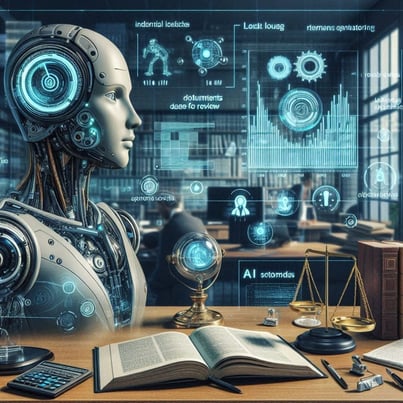Artificial Intelligence in Modern Law Practice
Smiriti Michel Lakra
Bharath Institution Of Law, Tamilnadu
This blog is written by Smiriti Michel Lakra, a Third-year law student of Bharath Institution Of Law, Tamilnadu


INTRODUCTION
Artificial Intelligence (AI) is the creation of computer system capable of executing tasks that usually demand human Intelligence. These tasks encompass solving problem, making decision, understanding language, and recognizing pattern, within the realm of legal practice. AI primarily depend on three main technologies: machine learning (ML), natural learning processing (NLP) and automation.
Machine Learning (ML)
Machine Learning is a part of AI that concentrates on the capability of system to learn from the data and enhance their performance over time without direct programming. In the legal sector, machine learning is especially beneficial due to its ability to analyse extensive data sets, spot pattern and forecast outcome.
Natural Language Processing (NLP)
Natural Language Processing (NLP) is a field of AI that enables computer to comprehend, interpret, and respond to human language. This area is decisive in the legal sector, where the interpretation of language often complex and subtle is the art of profession.
Automation
Automation involves the application of AI to carry out monotonous routine tasks without need for human input. In legal field, automation can simplify numerous administrative and procedural tasks, allowing legal professional to concentrate on more intricate and strategic matters.
ARTIFICIAL INTELLIGENCE IN INDIA PROFESSION
From typewriters to computers from libraries to online legal database and from faxes to email, technology has greatly changed law. Now AI is coming into law, a huge but slow moving market. AI can revolutionize how lawyers work and how law is viewed in India.
India’s first considerable move in Artificial Intelligence strategy was the creation of the AI Task Force Report. This group led by TATA Sons Chairman N. Chandrasekaran in the
commerce and Industry Ministry aimed to deeply examine the financial benefits and overall impact on India. The nature of the Indian Legal profession be in need that the entire operation be accomplished manually because the legal sector is still regarded as labouring.
As a result, AI is still in its early stages with many other exponents that the technology should not be widely used since it could someday take over the humanity and thus evade the concept of AI in legislation.
THE LEGAL INDUSTRY ACQUIRE THE TECHNOLOGY AND ARTIFICIAL INTELLIGENCE (AI) TOOLS DURING THE COVID – 19
The coronavirus pandemic has a big impact on people’s lives and in the legal world it has made the lawyer and judges realize how important technology is with social distancing leading to lockdowns and courts are now handling only urgent cases through the video conference and e filling of legal document as the order by the supreme court. In the cases of Swapnil Tripathi vs Supreme court of India the court recognized the need for the living streaming of court proceedings except in the rape and matrimonial disputes.
The wheels of justice cannot be stopped because of lockdown delivering by the Sikhir justice during the Covid-19 however the technology has been crucial from e-filling to online payment of court fees. The Delhi high court has been created the e-rooms, making some courtrooms completely paperless and people can check their cases in detail.
THE CURRENT STATE OF ARTIFICIAL INTELLIGENCES IN LAW
Artificial Intelligence (AI) is one of the most signification technological developments of the contemporary digital era. In essence, artificial intelligence(AI) involves development in computer system that can do activities that normally need human intelligence. Learning from data, identifying pattern, coming to conclusion and even comprehending natural language are all example of these task.
Although artificial intelligence(AI) has been around since the beginning of the 20th century, its potential has recently increased enormously as a result of the development in machine learning techniques, processing power and data availability.
Concerning law, India has implement programs such as the National strategy for AI which is administered by the NITI Aayog. These initiative concentrate on the responsible application of AI in area such as infrastructure, healthcare and agriculture. Concern about AI privacy are also addressed with the digital personal.
ARTIFICIAL INTELLIGENCE APPLICATION IN LEGAL PRACTICE
Legal research and cases analysis: legal researcher are helped by artificial intelligence (AI) systems such as Westlaw Edge and LexisNexis. These modern technologies provides fast and high relevant information by analysing huge database of statues, cases law and texts. By identify significant legal precedents and trends in earlier cases, artificial intelligence(AI) not only expedites that research process but also improves the accuracy of finding.
Document Review and Due Diligence : AI programs like eBrevia and kira systems are being utilized to automate the review of document and particularly in the context of due diligence. Artificial intelligence (AI) assist the lawyer to detect danger, legal, clause, or potential concerns without having the manually read through every document by quickly scanning and classifying it. These ensures accuracy while significantly reducing down on the amount of time required for the due diligence.
Predictive Analytics : AI programs , such those provide by Premonition and Ravel Law forecast the result of court cases based on historical cases data. Attorneys can improves cases strategy by examining the action of judge in the past, their verdicts and their win and loss records which can helps inn future cases. By giving the law firms information into cases probability success based on past data, predictive analytics technologies help them make better decision.
REFERENCE
1. Role of artificial intelligence in law - iPleaders
2. Artificial Intelligence Law: Is AI Taking Over? | The Lawyer Portal
3. Ajayi, Jeremiah, Artificial Intelligence in the Nigerian Legal Industry: A Threat or an Opportunity? (April 12, 2020). Available at SSRN: https://ssrn.com/abstract=3574324 or http://dx.doi.org/10.2139/ssrn.3574324
4. Scope of Artificial Intelligence in Law - Legal Desire Media and Insights
